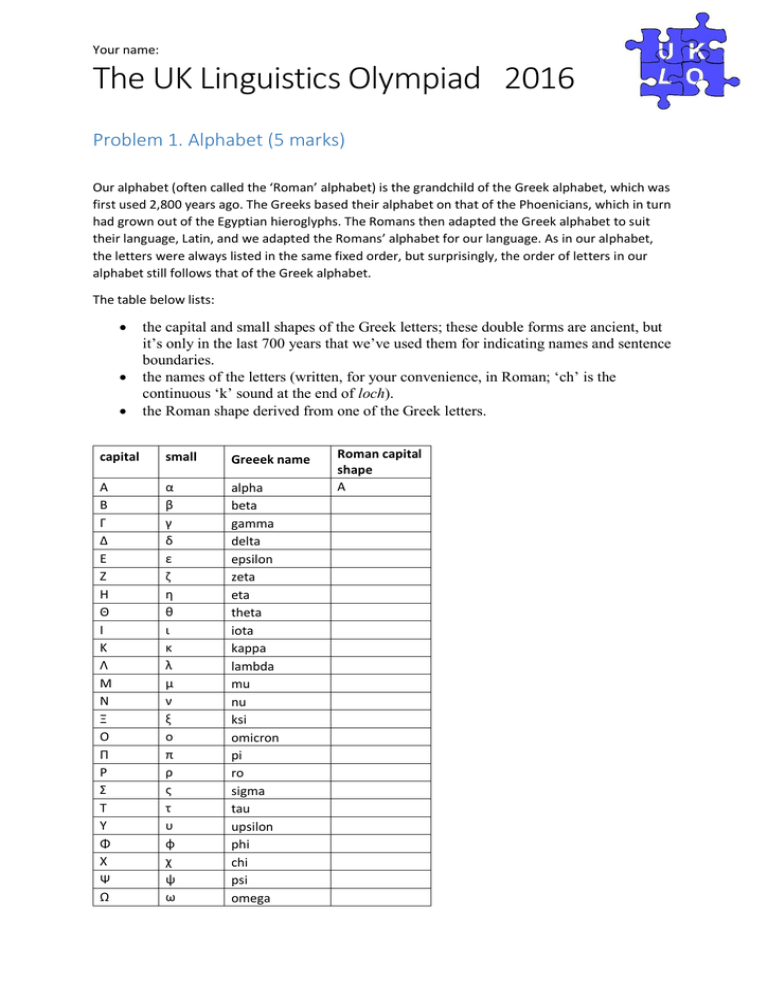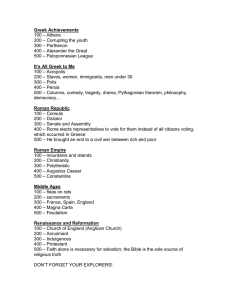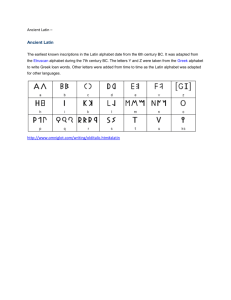1. Alphabet
advertisement

Your name: The UK Linguistics Olympiad 2016 Problem 1. Alphabet (5 marks) Our alphabet (often called the ‘Roman’ alphabet) is the grandchild of the Greek alphabet, which was first used 2,800 years ago. The Greeks based their alphabet on that of the Phoenicians, which in turn had grown out of the Egyptian hieroglyphs. The Romans then adapted the Greek alphabet to suit their language, Latin, and we adapted the Romans’ alphabet for our language. As in our alphabet, the letters were always listed in the same fixed order, but surprisingly, the order of letters in our alphabet still follows that of the Greek alphabet. The table below lists: the capital and small shapes of the Greek letters; these double forms are ancient, but it’s only in the last 700 years that we’ve used them for indicating names and sentence boundaries. the names of the letters (written, for your convenience, in Roman; ‘ch’ is the continuous ‘k’ sound at the end of loch). the Roman shape derived from one of the Greek letters. capital small Greeek name Α Β Γ Δ Ε Ζ Η Θ Ι Κ Λ Μ Ν Ξ Ο Π Ρ Σ Τ Υ Φ Χ Ψ Ω α β γ δ ε ζ η θ ι κ λ μ ν ξ ο π ρ ς τ υ φ χ ψ ω alpha beta gamma delta epsilon zeta eta theta iota kappa lambda mu nu ksi omicron pi ro sigma tau upsilon phi chi psi omega Roman capital shape A Your name: The UK Linguistics Olympiad 2016 Question 1.1. Complete the column headed ‘Roman shapes’. Remember: you’re only looking for the shapes of the letters, so you should ignore their values (the sounds they represent). You can use either upper- or lower-case Roman letters. Don’t expect to fill every space – some Greek letters didn’t give us any letter shapes. Question 1.2. Most of the Roman letters have the same values as the Greek letters from which they get their shapes; but four have different values. Based on the names of the letters given above, which of the Roman letters have different values from their Greek ancestors? Question 1.3. Here are some Greek words written in the Greek alphabet. Write (in the Roman alphabet!) an English word that is derived from each Greek word. αλφαβετα ατομος θεωρια αρχιτεκτον Your name: The UK Linguistics Olympiad 2016 Problem 1. Alphabet (5 marks) Our alphabet (often called the ‘Roman’ alphabet) is the grandchild of the Greek alphabet, which was first used 2,800 years ago. The Greeks based their alphabet on that of the Phoenicians, which in turn had grown out of the Egyptian hieroglyphs. The Romans then adapted the Greek alphabet to suit their language, Latin, and we adapted the Romans’ alphabet for our language. As in our alphabet, the letters were always listed in the same fixed order, but surprisingly, the order of letters in our alphabet still follows that of the Greek alphabet. The table below lists: the capital and small shapes of the Greek letters; these double forms are ancient, but it’s only in the last 700 years that we’ve used them for indicating names and sentence boundaries. the names of the letters (written, for your convenience, in Roman; ‘ch’ is the continuous ‘k’ sound at the end of loch). the Roman shape derived from one of the Greek letters. capital small Greeek name Α Β Γ Δ Ε Ζ Η Θ Ι Κ Λ Μ Ν Ξ Ο Π Ρ Σ Τ Υ Φ Χ Ψ Ω α β γ δ ε ζ η θ ι κ λ μ ν ξ ο π ρ ς τ υ φ χ ψ ω alpha beta gamma delta epsilon zeta eta theta iota kappa lambda mu nu ksi omicron pi ro sigma tau upsilon phi chi psi omega Roman capital shape A B C D E Z H I K L M N O P S T U X [accept w] Your name: The UK Linguistics Olympiad 2016 Question 1.1. Complete the column headed ‘Roman shapes’. Remember: you’re only looking for the shapes of the letters, so you should ignore their values (the sounds they represent). You can use either upper- or lower-case Roman letters. Don’t expect to fill every space – some Greek letters didn’t give us any letter shapes. Question 1.2. Most of the Roman letters have the same values as the Greek letters from which they get their shapes; but four have different values. Based on the names of the letters given above, which of the Roman letters have different values from their Greek ancestors? C H P X Question 1.3. Here are some Greek words written in the Greek alphabet. Write (in the Roman alphabet!) an English word that is derived from each Greek word. αλφαβετα alphabet ατομος atom θεωρια theory αρχιτεκτον architect Scoring: max 29 1.1, 1.2: one point for each correct answer (max 17 + 4 =21). o Ignore any entries in cells that should be blank. o No mark for w (from omega) because it’s out of order, and factually wrong. 1.3: two points for each correct word (max 8) o Accept any word containing the words shown, e.g. alphabetical, atomic Comment This problem is intended to awake an interest in the history of our alphabet, but also requires a clear distinction between the letter itself (defined by its shape) and its value (the sound/phoneme that it corresponds to). #1.1. Most of the letters are obvious. Exceptions: C – similar in shape to both capital and small Greek, though rotated, but obvious from the order, between B and D. L – same as for C. S – more similar to the small Greek letter, and again identifiable by the order (confusingly, between P = r and T) U – again more similar to the small Greek letter, and again by the order (just after T). #1.2. Once the letter shapes are in place, the question is how to work out their Greek values. This is easy because the Roman versions of the Greek letter names always start with the value; e.g. alpha Your name: The UK Linguistics Olympiad 2016 starts with the value /a/ for the letter concerned. Once this principle is recognised, it’s easy to see which Greek values are different from the corresponding Roman one. #1.3. Given the Greek values for the Greek letters, it should be easy to work out which English words come from the Greek words shown, though the word-shapes are slightly different – in particular, the English words have no suffix corresponding to the one in Greek.


